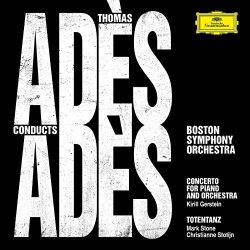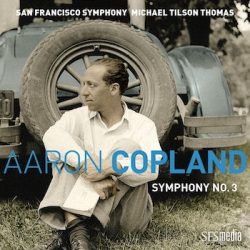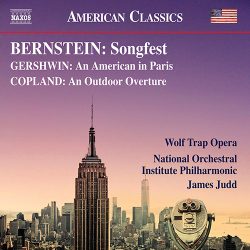Classical CD Reviews: Thomas Adès’s Orchestral Works, Aaron Copland’s Symphony no. 3, and Leonard Bernstein’s “Songfest”
By Jonathan Blumhofer
A terrific release showcases the Boston Symphony Orchestra and composer Thomas Adès; Michael Tilson Thomas and the San Francisco Symphony deliver a radiantly honest version of Aaron Copland’s Symphony 3; the National Orchestral Institute Philharmonic releases a generally admirable album with a couple of true rarities.
 If there’s a more aptly macabre piece to listen to during the Coronavirus pandemic than Thomas Adès’ Totentanz, I’m not sure what it is. A 2013 setting of an anonymous, 15th-century text that appeared under a (now-destroyed) frieze in the Marienkirche in Lübeck, the score depicts each rung of human society, from Pope to baby, encountering Death and joining in his dance.
If there’s a more aptly macabre piece to listen to during the Coronavirus pandemic than Thomas Adès’ Totentanz, I’m not sure what it is. A 2013 setting of an anonymous, 15th-century text that appeared under a (now-destroyed) frieze in the Marienkirche in Lübeck, the score depicts each rung of human society, from Pope to baby, encountering Death and joining in his dance.
Grim though the subject matter may be, it has called forth some of Adès’s finest, most bracing and inventive writing to date. Slashing brass fanfares, shrill woodwind riffs, and unsettled rhythmic patterns alternate with moments of sinuous passagework (for the Emperor), breathtaking atmosphere (the Parish Clerk), and, at the end, a devastating dance between Death and a Child.
Simply put, the list of pieces that combine technical and harmonic daring of this caliber with emotional directness is a short one.
Accordingly, Totentanz’s premiere recording, with Adès conducting the Boston Symphony Orchestra (BSO) and soloists Mark Stone and Christianne Stotijn, is thoroughly captivating.
Both singers are excellent, Stone as an implacable Death and Stotijn as his various victims (who run the gamut from terrified to confused and accepting). Indeed, one might consider theirs to be career-defining performances – that is, if Stone and Stotijn weren’t already such highly esteemed and established artists. Either way, for depth of feeling and technical precision, it’s hard to imagine these parts better or more passionately sung.
Adès leads the BSO in a performance of furious brilliance, one that fully lives up to my recollection of the live performances from which this recording was drawn.
Similarly terrific is the reading of Adès’s Concerto for Piano and Orchestra that completes the disc. A brilliant send-up of the keyboard concerto tradition, this is a piece that gambols wildly from hi-jinx (in the outer movements) to pathos (in the middle one), alluding to various 20th-century forerunners (notably Gershwin and Ravel) along the way – all the while somehow never lapsing into condescension or imitation. It’s a staggering technical feat and, especially in these dark days, a welcomely insouciant one, expressively.
In it, Kirill Gerstein navigates the solo part with electrifying ability while the BSO digs into their involved accompanimental part with zest.
The album’s sonics are excellent, all parts (particularly the soloists) carefully balanced and no section of the orchestra unnaturally removed from the scene of the action. Though drawn from live concerts, there’s minimal audience noise to boot.
A terrific release, this, showcasing the BSO, Adès, and Friends at their best. Don’t miss it.

If there were ever a time to revisit Aaron Copland’s Symphony no. 3, now would be it. Written just after the end of World War II and premiered in Boston in 1946, the Symphony’s majestic peroration – which incorporates Copland’s famous Fanfare for the Common Man – seemed to herald the dawn of a new, hopeful fraternal age.
Of course the last 75 years have been anything but. Still, despite many missed opportunities, the triumphant vision of Copland’s score hasn’t lost any of its power of appeal or to thrill.
Michael Tilson Thomas’s new recording of the piece with the San Francisco Symphony (SFS) certainly reminds us of this. Released as part of the conductor’s (now-canceled) 25th and final season at the helm of the SFS, his is a performance of radiant honesty.
It ably captures the elemental quality of Copland’s writing – and with a degree of textural clarity that calls to mind MTT’s terrific SFS/Copland recordings of the late-’90s.
Throughout, there’s a strong sense of direction. The first movement, though never unduly pushed, drives purposefully. So does the third, in which the exposed string introduction is played with beautiful poise and the tonal blend among the SFS woodwinds compellingly shaped. In the second, spunky, tight rhythms and smartly paced shifts of tempo dance nimbly together.
To be sure, MTT’s is an interpretation that reminds you just how good a composer Copland was: not only are the proceedings strongly etched, but the motivic strands that tie the Third together are subtly – but glowingly – illuminated. The accumulation of themes just before the coda is magical, while, as a result, that final peroration has rarely sounded more cathartic.
By any measure, there are more than a few great recordings of this piece already: both of Leonard Bernstein’s classic accounts and Leonard Slatkin’s recent one come quickly to mind. But MTT’s, for its sheer command of the music, eloquence, and pristine engineering, sets a bar all its own.
 There’s much to admire, generally, about the National Orchestral Institute Philharmonic (NOIP), a summer orchestra comprising students from leading U.S. conservatories that’s now released four albums of music by American composers. Their latest offering pairs a couple of true rarities – Copland’s An Outdoor Overture and Leonard Bernstein’s inexplicably neglected Songfest – with George Gershwin’s popular An American in Paris.
There’s much to admire, generally, about the National Orchestral Institute Philharmonic (NOIP), a summer orchestra comprising students from leading U.S. conservatories that’s now released four albums of music by American composers. Their latest offering pairs a couple of true rarities – Copland’s An Outdoor Overture and Leonard Bernstein’s inexplicably neglected Songfest – with George Gershwin’s popular An American in Paris.
Their account of the Gershwin features the 2019 critical edition (recently given its debut recording by the Cincinnati Symphony). In this performance, the NOIP, led by James Judd, turns in a performance marked, at the start, by a strong sense of character, style, and shape, as well as plenty of rhythmic energy.
True, the sultry trumpet solo during the “Blues” episode lacks a degree of nostalgia, and the “Charleston” is a hair square. Even so, textural balances are winningly clean (the woodwind lines at the end of the latter speak freshly) and there’s a natural exuberance to the whole undertaking.
A similar effervescence marks Copland’s sunny 1938 Overture, which features a finely executed trumpet solo, some excellent woodwind playing (flute and clarinet solos are top-notch), and, generally, fine balances and plenty of rhythmic brio across the ensemble.
Alas, things don’t hold together quite so well in Songfest, Bernstein’s 1977 celebration of the United States’s first two-plus centuries. It’s one of his finest, most personal works, yet there’s little sense that the NOIP has a firm grasp of the sophisticated rhythmic and metrical complexities of Bernstein’s style.
As a rule, this is a Songfest that feels held back and precious – not to mention lacking in expressive excess. The second half of the setting of Lawrence Ferlinghetti’s “The Pennycandystore Beyond the El” isn’t agitato, as indicated in the score. Nor does “mienten Julia de Burgos” “break out” (as the score calls for) in “A Julia de Burgos.”
One can’t entirely fault Judd for this – he’s an accomplished Bernstein conductor, after all – but it’s hard to get past the sense that he’s simply doing his best to keep things from falling apart.
The opening “To the Poem” is soupy, done in by the vibrato-heavy singing of a sextet of soloists drawn from the ranks of Wolf Trap Opera. “To My Dear and Loving Husband” is lethargic. Bernstein’s setting of Conrad Aiken’s “Music I Heard with You” is likewise sluggish, as well as lacking in structural shape. Even the concluding “Israfel” (a setting of Poe!) is firmly grounded: the dance never leaves the ground (as it does in Bernstein’s and Leonard Slatkin’s respective recordings of the piece).
By far, the best thing about this Songfest is tenor Alexander McKissick’s snappy, characterful take on Gregory Corso’s “Zizi’s Lament.” But nothing else here fully rises to the same level.
That said, every piece here is impressively recorded, and the balances between voices and orchestra in Songfest are judiciously handled.
Jonathan Blumhofer is a composer and violist who has been active in the greater Boston area since 2004. His music has received numerous awards and been performed by various ensembles, including the American Composers Orchestra, Kiev Philharmonic, Camerata Chicago, Xanthos Ensemble, and Juventas New Music Group. Since receiving his doctorate from Boston University in 2010, Jon has taught at Clark University, Worcester Polytechnic Institute, and online for the University of Phoenix, in addition to writing music criticism for the Worcester Telegram & Gazette.
